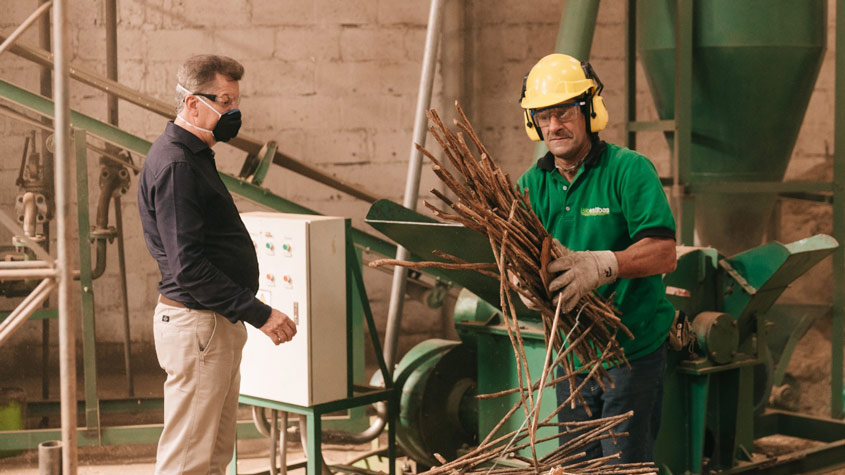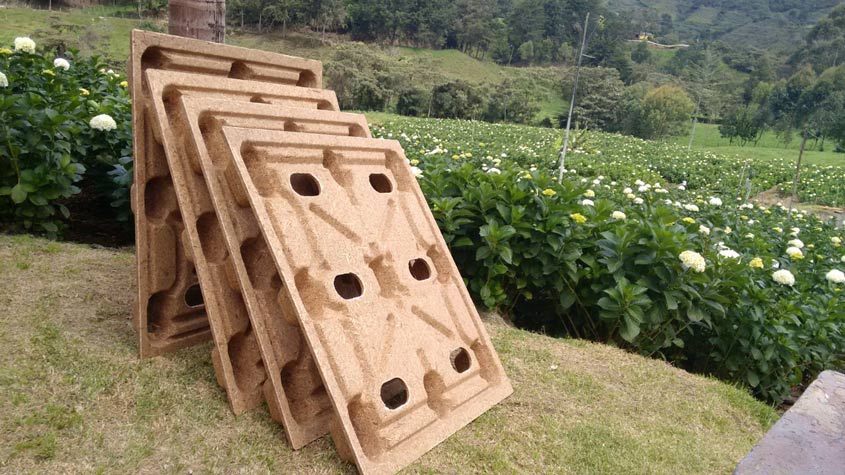Sustainable Storage: eco-pallets made from flower stems
Bioestibas offers companies that need to pack, transport or store their goods an ecological alternative. Since 2015, Bioestibas has been diverting agricultural waste, which would otherwise have been incinerated, into a production process that creates innovative eco-pallets from flower stems. In many respects these eco-pallets are far superior to traditional wooden pallets; they are fireproof, water- and pest- resistant and lighter and stronger than traditional pallets.

Bioestibas is the first plant in Latin America to produce eco-pallets. The company converts agricultural waste – the stems of flowers, specifically, hydrangeas, also commonly known as “mopheads” – to create stowage pallets, which are an essential resource for packaging and logistics.
The company’s 4,700 square meter processing plant is based in La Ceja, Antinoquia. When it began operating in July 2015, it employed 19 people, today the company employs around 30 people and is an important source of income for the 1,100 flower growers who provide Bioestibas with some 9,000 tones of hydrangea stems every month. These stems are then transformed into high-quality eco-pallets. By transforming 250 tons of hydrangea crop waste into fully recyclable pallets every month, Bioestibas is supporting sustainable production and a greener future. “Bioestibas was the result of efforts to find value-generating uses of the tens of thousands of tons of agricultural waste produced from floriculture in Antioquia,” says Álvaro Vásquez Osorio, CEO of Bioestibas.
In Colombia, flower growers typically dispose of their agricultural waste by incineration. However, burning the flower stems releases toxic hydrogen cyanide (HCN) fumes into the atmosphere. Using the stems as fertilizer is not an option as they make the soil acid when they decompose and release methane into the atmosphere.
“With our approach, we have been able to cut air pollution. In the past this agricultural waste would have been incinerated but for us it is a valuable raw material, which we now use to create our eco-pallets. It also means that we have been able to stop felling trees, which is good news for the surrounding natural environment,” Mr. Vásquez Osorio notes.
Bioestibas has won many awards worldwide for its commitment to sustainability and eco-design. The company won second prize for its environmental achievements at the VIVA Schmidheiny 2020 Awards, in Costa Rica, having also won the Energy Globe Award in Espoo, Finland, in 2019, for re-using agricultural waste.
Today, Bioestibas exports its eco-pallets to Argentina, Chile, Costa Rica, the Dominican Republic, Ecuador, Guatemala, Mexico, and Peru as well as and European countries, including Germany, the Netherlands and the United Kingdom.
Business results
- Bioestibas’ green business model prevents the felling of 775 trees every month and around 1,260 tons of CO2 emissions by avoiding the incineration of agricultural waste.
- Bioestibas exports 98 percent of its outputs, which generate around USD 3.5 million in annual sales.
- Bioestibas offers its customers a high quality eco-friendly and long-lasting alternative to traditional wooden pallets.

Research inspires a new business idea
Studies undertaken by the Laboratory of Forest Products "Héctor Anaya López" of the Faculty of Agricultural Sciences of the National University of Colombia found that the long fibers in the stems of hydrangeas offer superior properties to those found in coniferous woods. On the strength of this study, Bioestibas began exploring ways to reuse the fiber found in hydrangea stems to produce its pallets.
Bioestibas used the research findings to build the required technological equipment to separate the fiber the hydrangea stems in its production plant. The hydrangea stems are first left to dry in the sun for two days to reduce humidity levels by up to 40 percent. "The high quality of the fiber found in the stems of hydrangeas and their low level of humidity make them a perfect raw material for our purposes," says Mr. Vásquez Osorio.
Once dried, the stems are fed into the production line for cutting, grinding, drying, dosing and mixing with the “green resin,” made from wood waste supplied by local sawmills. The mixture is poured into molds, and is then subject to high temperatures and high pressure to form the pallets.
Bioestibas's production model is underpinned by the principles of the circular economy in that it provides for the recycling of old pallets to produce new ones. Re-using hydrangea crop waste is a win-win solution that enables the production of lighter organic stowage that is seven times more resistant to pests, vectors, and fire than traditional pallets. It is also water-repellent, has no oxidation problems and is competitively priced.
Bioestibas also supports Antioquia's local economy and provides a valuable source of income for the families of local flower growers. "We saw an opportunity to create value from the large volume of agricultural waste produced by local flower growers and developed a novel way to convert this waste into our high-value eco-pallets. Many flower growers specialize in cultivating hydrangeas in eastern Antioquia, that is why we set up our plant in La Ceja," Mr. Vásquez Osorio explains.
Find out how Bioestibas uses the hydrangea stems to create its eco-friendly pallets.
IP protection and green technology
The team at Bioestibas believes that intellectual property (IP) rights are a great ally for the development of a "green economy" development, bringing new benefits for sustainable production.
"When our team of professionals worked on the development of a "green resin”, and when the traditional producers of chemical resins simultaneously tripled their prices, we understood the imperative of protecting our technology with IP rights", says Bioestibas. Bioestibas has since secured a patent for its award-winning “green resin,” which is a key ingredient in its production process and with these rights in hand the company has been able to attract funding.
The company’s IP strategy has allowed Bioestibas to strengthen its competitive advantage and enabled it to generate income from its technology, while also promoting the principles of sustainability and the circular economy.